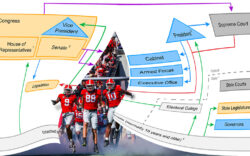One long-ago summer, I taught a political science course at UGA and tutored some football players in the same subject at night. Most of the players were from the Pennsylvania coal fields, an old UGA tradition when so many homegrown football players, regardless how talented, could not be signed because of their skin color.
The course covered the structure of government, and it was kind of like teaching architecture or geometry. You had the three branches of government—the executive, the legislative and the judicial—and there were checks and balances to make sure one branch didn’t dominate the other, and it was all based on the Constitution, written by a bunch of white men in a room in Philadelphia in ancient times. It was all really abstract. We didn’t hear much about the government in real life. We might get excited during presidential elections, but otherwise, there was no 24-hour cable news cycle, no Facebook, no email appeals for campaign funds. You just had a vague idea that the government was up there in Washington, and you kind of knew what it did, but who cared?
My job was to make them care enough to be able to pass the course. That was especially difficult for the football players, who were sent there to help them keep their grades up for football. They were not interested in the government. How could I blame them, since hardly anybody else was? I can see in retrospect that I should have grabbed some chalk and diagrammed the government like a football play, but I didn’t think of it. All I remember is their blank stares as I tried to pump some excitement into the separation of powers.
I hadn’t realized yet that I was never going to make a political science teacher, but I think maybe the realization began during those summer nights when I wished just as hard as the players that we were somewhere else, talking about other things with other people. I heard later that they all got good enough grades to remain eligible, so there’s that.
These days, I think how exciting it must be to teach political science. Our news all day, every day, is dominated nonstop by the government and especially by the head of the executive branch. He is manipulating the members of the legislative branch to appoint a member of the judicial branch. Members of the legislative branch not too long ago impeached the head of the executive branch. During that process, the Constitution was constantly evoked as if it were actually a living document after all.
Now, suddenly we’re trying to understand the order of succession if the head of the executive becomes incapacitated and how his inability to continue would affect the imminent election.
I explained to those football players the fundamental right of voting, which is such a ho-hum deal that half the country doesn’t bother, but they would have been shocked to find out that their votes might not get counted, might not get delivered, might be changed by Russian bots.
Those guys I tutored were accustomed to Dwight D. Eisenhower and John F. Kennedy, and they were just becoming acquainted with Lyndon B. Johnson; Richard M. Nixon was yet to come. How could I have explained Donald J. Trump to them? How could I have prepared them for the effects of a president ignorant of the Constitution who disrupts the impartiality of the judiciary, intimidates one branch of Congress and ignores the other, fills the executive branch with cronies without the advice and consent of the Senate, ignores a worldwide pandemic, denies climate change, encourages racial division, exacerbates income disparities, undermines our elections, lies constantly, attacks the free press, consorts with despots, uses the government to enrich his family, denigrates our military, attacks our allies, cancels treaties, criminalizes immigration, despoils our natural resources and encourages through his own example the decline of civil discourse, and the rise of boorishness and bullying in our public life.
Teaching political science must be a lot more exciting these days since the separation of powers, the emolument clause, the powers of the executive, etc., fill everyday conversation, and the Electoral College is no longer assumed to play football. On the other hand, poli-sci profs have to take into consideration that some of their students are armed—another argument for virtual learning.
Like what you just read? Support Flagpole by making a donation today. Every dollar you give helps fund our ongoing mission to provide Athens with quality, independent journalism.










